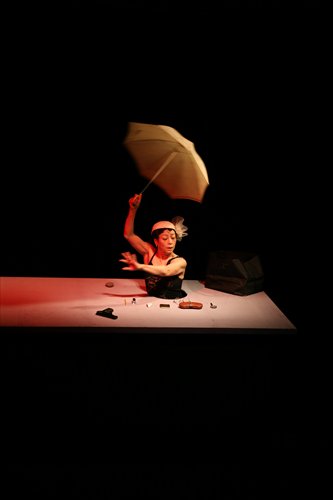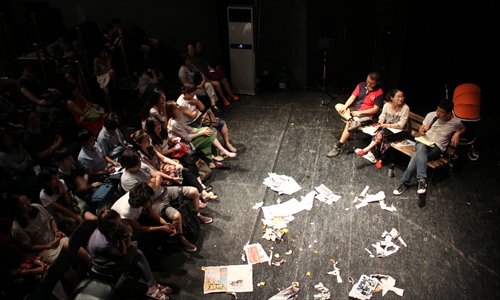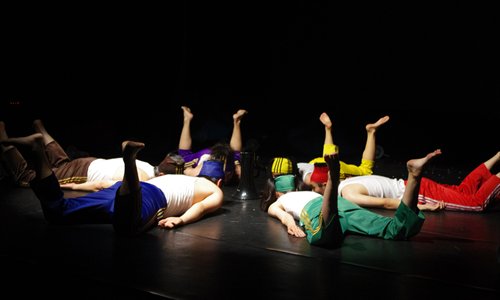Dramatic independence
Independent theater groups struggling to survive

A scene from a play staged during the Nanluoguxiang Theater Festival held by independent Beijing theater Penghao Theater. Photo: Courtesy of Penghao Theater
"Drama is the highest capacity of human beings."
These were the words of Wang Xiang, the owner and artistic director of Penghao Theater.
Despite, or perhaps because of Wang's lofty ideals when it comes to performance arts, he is disappointed with the many State-owned theaters, because he thinks they use a lot of resources but haven't accomplished enough, and they are increasingly being commercialized. So in 2009, he founded the Penghao Theater in the Dongmianhua Hutong in Dongcheng district, close to the Central Academy of Drama. Wang told the South Reviews that plays should be "independent from the government, the commercial world, techniques, and personal desires."
Independent theaters usually refer to professional drama producers outside of the major studio system or State-owned theaters, which in China, receive most of the theater resources. Meanwhile, independent theater groups tend to pursue productions for artistic reasons, rather than the desire for profit, which can pose challenges in terms of operations. These difficulties are exacerbated by the fact that most people in independent theater circles are nonprofessionals, caught between the system and the market.
Limited resources
In Beijing, small theaters are built every year. Some fall by the wayside, while others meet success. Theater groups Top Drama and Théatre du Rêve Expérimental are among some other Beijing-based independent theaters that have caught attention nationwide and internationally.
The increasing costs of large-scale theater productions have made smaller, independent productions more common due to their lower budget requirements, according to a report in the Literary Life Weekly.
However, people working on independent theater and drama groups in China face money issues and limited resources.
Wang said the Penghao Theater is open mainly to people who are loyal to "aesthetic appeal, literary appeal, rational standards and lively standards, but resist vulgar and excessive commercialization." The theater doesn't charge performance groups who perform there, and operates by splitting the proceeds from the box office. The small theater can fit 80 audience members. In the past five years, this theater has independently produced more than 20 plays and put 160 plays on stage (the number of showings has reached more than 1,500).
It was built by Wang in 2008 using 1.2 million yuan ($195,938). As a dentist who runs three clinics, Wang has to use around 700,000 yuan from the profits of the dental clinics for the operation of the theater every year.
The Nanluoguxiang Theater Festival is an annual event and was held for the fifth time this year from May to July. It featured 50 stage plays, as well as workshops and lectures. This year, an online crowdfunding project was needed to raise money to hold the festival. While Wang is worried about money for the theater and the festival, Hong Yusan, from Guangzhou, Guangdong Province, wishes she had the same problem.
"It would be so wonderful if I had my own theater," Hong told the South Reviews. She recalled how she directed Shakespeare's Much Ado about Nothing and organized a team to put on the show two years ago. "The rent was very expensive, sometimes costing more than 10,000 yuan or even tens of thousands." Unable to find a suitable small theater, she had to put on the show at an assembly hall of a local vocational school, and she was unsatisfied with the lighting and sound since the hall is not a professional theater.
Hong pointed out that the atmosphere of theater appreciation in Guangzhou is not as developed as in Beijing, and especially restricted in terms of resources such as performance venues and human resources. Compared to the many art school students in Beijing, white collar workers recruited by Hong couldn't make every rehearsal. Hong acted as the playwright, director and field assistant for months. "It was not satisfactory. Some people left in the middle, and were not committed enough. Not everybody had desires as strong as mine."

The acting staff of independent theater Penghao Theater have a discussion with the audience after a show. Photo: Courtesy of Penghao Theater

A scene from a show during the Nanluoguxiang Theater Festival. Photo: Courtesy of Penghao Theater
Beyond the mainstream
In June, at the Donggong Theater in Beijing's Dongcheng district, a play called The World's Factory was put on by theater group the Grass Stage, which had come all the way from Shanghai. The show had been performing for over a month in other cities in China. It discussed problems in China's industries and China's workers, with left-wing views and reflection. The founder of the group, Zhao Chuan, expressed his concerns before the performance.
"They have those soft chairs in movie theaters, and people's inclination is to accept the entertainment, rather than to think deeply," Zhao told the South Reviews.
Like the Grass Stage, most independent theaters are more focused on whether their ideas are well-received by the audience, instead of making money.
"The State-owned theaters are quite marketized. The market requires small input and big output, making innovation impossible. But independent theaters are not confined by the market," playwright Huang Jisu told the South Reviews. "Fun should be an important factor in independent theater. We think the foundation of independent theater is the growth of the middle class. It's about fun."
The Grass Stage is one of China's most established private theaters, and almost every single member is not a professional actor. Their occupations vary from office clerks to psychological therapists and engineers.
The independent theater circle is full of amateur actors, and they feel obstructed by their lack of knowledge and skills, but they highlight their passion and talent. For example, Hong quit her job at a well-paid position in a State-owned company and became a freelancer, so that she could be more committed.
For most amateurs, frequently participating in workshops with drama masters from both home and abroad is one of the major ways to improve their techniques, communicate with each other about the art of performing and the theater aesthetics, and learn different drama concepts. The workshops can last from one afternoon to a few days to even a few weeks, the South Reviews reported.
Meanwhile, even in the system, the professionals and amateurs often complement each other. For example, influential directors Mu Sen and Meng Jinghui started out as amateurs outside of the system. Theater researcher Tao Qingmei categorized the two directors' early theater experiments as "campus theater."
Mu's first drama was staged on campus in 1984 when he was still a student at Beijing Normal University. When Meng joined a theater group at the end of 1980s, he was a teacher. Meng started his professional career after he enrolled in The Central Academy of Drama and became a director at the National Theater of China, accomplishing a transfer from outside of the system to the inside. On the other hand, Mu has been always on the outside and is typically seen as "independent." As a matter of fact, Mu had times when he struggled, especially in the late 1980s and early 1990s. But Tao pointed out that, "Maybe it's due to these special survival experiences that Mu later found a unique theater feature in his creations," to confront the mainstream ideology.
Free spirits
Théâtre Libre (Free Theater) founded by Frenchman André Antoine is seen as the beginning of the Independent Theater Movement at the end of the 19th century.
Right from the outset, the theater adopted an experimental attitude of acting against commercialization and tradition. The definition of "independent theater" by Mai Ronghao, founder of the non-profit experimental theater group The 1980s Theater based in Guangzhou, was that these groups "independently make plays they like, unfettered, without any utilitarian intentions, passionately and spontaneously making plays that belong to oneself, and fly free in the world of theater."
Yuan Hong is a senior producer who was founder of the Beijing College Student Drama Festival and worked for China's first privately-operated modern theater, Beibingmasi Theater, which opened in 2003 and shut down in 2005. He thinks independent theater shouldn't be a minority concept and shouldn't reject the market entirely.
"Independence doesn't mean completely rejecting the market, but means [surviving] without depending on those [market factors]," he said. "Dramas should be guiding the audience to get involved in society, almost in an antagonistic way as they explore problems people are unwilling to face."
But rejecting the mainstream doesn't mean focusing only on expressing oneself and losing touch with the majority of the audience.
Chief editor of Taiwan-based magazine Performing Arts Review Chia-Chi Li told the Literary Life Weekly that "Theater performance can never be independent from the audience. I think a good director of a little theater will never ignore the audience. He or she will communicate with the audience using a theme and a method that are different from those we are familiar with."
After all, as Alfred Hitchcock said, "Drama is life with the dull bits cut out."
Agencies - Global Times